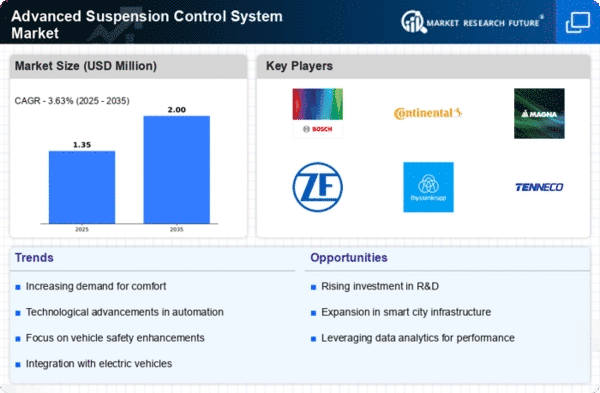Top Industry Leaders in the Advanced Suspension Control System Market

*Disclaimer: List of key companies in no particular order
Latest Company Updates:
The global advanced suspension control system market is revving up, fueled by rising demand for comfort, safety, and autonomous driving functionalities in modern vehicles. This dynamic landscape sees established players jockeying for position alongside innovative startups, all vying for a slice of the projected multi-billion dollar pie. Understanding the key strategies, evolving trends, and market share factors is crucial for navigating this competitive terrain.
Key Player Strategies:
Tier 1 Automotive Suppliers: Giants like Continental, ThyssenKrupp, and ZF Friedrichshafen leverage their established relationships with automakers and diverse product portfolios to offer integrated suspension solutions. They prioritize research and development, focusing on advanced technologies like semi-active and active dampers.
Technology Leaders: Bosch, Infineon Technologies, and Denso excel in sensor technology and control algorithms, providing crucial components and software for advanced suspension systems. They collaborate with Tier 1 suppliers or directly with automakers to offer customized solutions.
Emerging Startups: Nimble players like BWI Group and Tremec are disrupting the market with innovative designs and cost-effective alternatives. They focus on specific niches like off-road or commercial vehicles, leveraging their agility to cater to unmet needs.
Market Share Analysis:
Technology Type: The type of suspension system significantly impacts market share. Currently, passive systems dominate, but semi-active and active systems are witnessing rapid growth due to their superior performance and increasing affordability.
Vehicle Segment: Luxury and premium cars currently lead the adoption of advanced suspension systems, but demand is steadily growing in mid-range and even budget segments. The rise of SUVs and electric vehicles further diversifies the market landscape.
Regional Dynamics: North America and Europe currently hold the largest market share, driven by mature automotive industries and high consumer preference for advanced functionalities. However, Asia Pacific is expected to witness the fastest growth due to a booming vehicle market and rising disposable incomes.
New and Emerging Trends:
Electrification: Electric vehicles pose unique challenges for suspension systems due to their heavier batteries and different weight distribution. Companies are developing solutions like adaptive air suspension to optimize ride quality and handling.
Connectivity and AI: Integration with onboard sensors and vehicle-to-everything (V2X) communication is enabling predictive suspension adjustments, real-time road condition adaptation, and personalized driving experiences.
Sustainability: Manufacturers are exploring recycled materials and lightweight designs to reduce the environmental impact of suspension systems. Additionally, energy-efficient control algorithms are being developed to minimize power consumption.
Overall Competitive Scenario:
The advanced suspension control system market is characterized by intense competition, with players jostling for market share through product differentiation, strategic partnerships, and aggressive R&D investments. Collaboration along the value chain is crucial for success, as Tier 1 suppliers, technology leaders, and automakers work together to develop and implement cutting-edge solutions. The focus is shifting towards offering customized and intelligent suspension systems tailored to specific vehicle types, driving styles, and road conditions. As technology advances and consumer preferences evolve, the competitive landscape is poised for further dynamism, demanding constant adaptation and innovation from market players.
Continental AG (Germany):
• December 2023: Announced a partnership with REE Automotive to develop active suspension systems for electric vehicles. This technology aims to improve ride comfort and handling, especially on rough terrain, and optimize battery life. (Source: Continental press release)
ThyssenKrupp AG (Germany):
• November 2023: Unveiled a prototype active suspension system for heavy-duty trucks. This system aims to reduce driver fatigue and improve road safety by automatically adjusting to road conditions and vehicle load. (Source: ThyssenKrupp website)
Infineon Technologies AG (Germany):
• October 2023: Introduced new sensor technologies for advanced suspension control systems. These sensors, including gyroscopes and accelerometers, provide precise data on vehicle motion, enabling more efficient and responsive suspension adjustments. (Source: Infineon press release)
BWI Group (China):
• December 2023: Successfully tested its next-generation active suspension system on a domestically produced SUV. This system features advanced algorithms and actuators that can react quickly to road changes, providing a smoother and more comfortable ride. (Source: China Automotive News)
Lord Corporation (U.S.): Developed magnetorheological dampers for high-performance vehicles. These dampers use magnetic fields to change the viscosity of a fluid, allowing for rapid adjustments in suspension stiffness. (Source: Lord Corporation website)
Top listed global companies in the industry are:
Continental AG (Germany), ThyssenKrupp AG (Germany), Infineon Technologies AG (Germany), and BWI Group (China). The Mando Corporation (South Korea), Lord Corporation (U.S.), Schaeffler AG (Germany), ZF Friedrichshafen AG (Germany), Magneti Marelli S.p.A (Italy), and Hitachi Automotive Systems (Japan) are among others.










